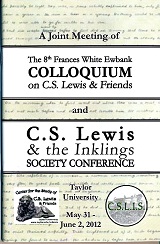Event Title
Academic Paper Session 2-B
Location
Rupp 205
Start Date
1-6-2012 10:30 AM
Description
"The Logic of Purgatory in C.S. Lewis: Why There Can Be No Spiritual Formation Without It" - Robert Moore-Jumonville
Purgatory figures significantly as a theme in the writing of C.S. Lewis. The Great Divorce represents the major fictional piece treating the subject, but theological allusions and references surface in Till We Have Faces, Narnia, and other fictional works, as well as in many of the essays.
This paper presents two main points: first, Lewis's logic of purgatory. Such an argument, though not stated explicitly anywhere by Lewis, might run like this: God is holy and human beings cannot remain in God's presence (comfortably or for long) without becoming holy themselves. Lewis consistently maintained a robust theology of sanctification. Next, if human beings are free -- and we are -- then God will not force us to let go of our sin. As illustrated so clearly in The Great Divorce, we cannot drag our Hell into Heaven with us (or it would cease to be Heaven). Therefore, to dwell with God in eternity, we must be purged of the sin that separates us from God.
The second point of the paper seeks to show how contemporary Protestants tend to think of death as instantly glorifying the individual. Not only would this be a breach of human freedom, it nearly makes spiritual formation in this life optional.
For any theology to take spiritual formation seriously, it ought to consider the biblical and theological roots of the purgatorial (in this life and the next) if not Purgatory itself as an actual place of residence.
"Ethics and the Afterlife: The Moral Instruction of Thomas Aquinas and C.S. Lewis" - H. Dennis Fisher
C.S. Lewis's view of moral values and life after death flowed from both Scripture and his medieval sensibilities. This paper will compare and contrast medieval theologian Thomas Aquinas' views of ethics and the afterlife with those of C.S. Lewis. Special attention will be given to the controversial doctrine of purgatory. In today's postmodern world, ethical teaching is often relative and subjective. This paper will seek to find commonalities between Aquinas and Lewis to provide a viable basis for moral decision making in the 21st century.
"Few Return to the Sunlit Lands: Lewis's Classical Underworld in The Silver Chair" - Benita Huffman Muth
As his early interest in Greek mythology and his Aeneid translation testify, classical motifs resonated with Lewis. In The Silver Chair, his characters, like Orpheus and Herakles, travel to a Greco-Roman inspired Underworld on a mission to retrieve an inhabitant. Besides lending mythic dimension to the journey, these classical echoes and Lewis' original additions create an Underworld markedly different from a popular idea of Hell. Through doing so, he underscores that this fictional place, though frightening and dangerous, is not Hell and therefore makes a theological point about the fallen condition.
By emphasizing classical references and reforming Miltonic ones (fiery Bism becomes a wondrous part of creation), Lewis presents Hell as a deliberate mental construction, an idea also reflected by the sprawling suburb of The Great Divorce and the dwarfs of The Last Battle. By examining The Silver Chair's appropriation of classical motifs and heroics, I will argue that, through differentiating this place from the popularly imagined Christian Hell, Lewis paradoxically asserts his fundamental Christian position about the power of individual free will in the human being's disposition of his or her own soul.
Event Type
Paper
Academic Paper Session 2-B
Rupp 205
"The Logic of Purgatory in C.S. Lewis: Why There Can Be No Spiritual Formation Without It" - Robert Moore-Jumonville
Purgatory figures significantly as a theme in the writing of C.S. Lewis. The Great Divorce represents the major fictional piece treating the subject, but theological allusions and references surface in Till We Have Faces, Narnia, and other fictional works, as well as in many of the essays.
This paper presents two main points: first, Lewis's logic of purgatory. Such an argument, though not stated explicitly anywhere by Lewis, might run like this: God is holy and human beings cannot remain in God's presence (comfortably or for long) without becoming holy themselves. Lewis consistently maintained a robust theology of sanctification. Next, if human beings are free -- and we are -- then God will not force us to let go of our sin. As illustrated so clearly in The Great Divorce, we cannot drag our Hell into Heaven with us (or it would cease to be Heaven). Therefore, to dwell with God in eternity, we must be purged of the sin that separates us from God.
The second point of the paper seeks to show how contemporary Protestants tend to think of death as instantly glorifying the individual. Not only would this be a breach of human freedom, it nearly makes spiritual formation in this life optional.
For any theology to take spiritual formation seriously, it ought to consider the biblical and theological roots of the purgatorial (in this life and the next) if not Purgatory itself as an actual place of residence.
"Ethics and the Afterlife: The Moral Instruction of Thomas Aquinas and C.S. Lewis" - H. Dennis Fisher
C.S. Lewis's view of moral values and life after death flowed from both Scripture and his medieval sensibilities. This paper will compare and contrast medieval theologian Thomas Aquinas' views of ethics and the afterlife with those of C.S. Lewis. Special attention will be given to the controversial doctrine of purgatory. In today's postmodern world, ethical teaching is often relative and subjective. This paper will seek to find commonalities between Aquinas and Lewis to provide a viable basis for moral decision making in the 21st century.
"Few Return to the Sunlit Lands: Lewis's Classical Underworld in The Silver Chair" - Benita Huffman Muth
As his early interest in Greek mythology and his Aeneid translation testify, classical motifs resonated with Lewis. In The Silver Chair, his characters, like Orpheus and Herakles, travel to a Greco-Roman inspired Underworld on a mission to retrieve an inhabitant. Besides lending mythic dimension to the journey, these classical echoes and Lewis' original additions create an Underworld markedly different from a popular idea of Hell. Through doing so, he underscores that this fictional place, though frightening and dangerous, is not Hell and therefore makes a theological point about the fallen condition.
By emphasizing classical references and reforming Miltonic ones (fiery Bism becomes a wondrous part of creation), Lewis presents Hell as a deliberate mental construction, an idea also reflected by the sprawling suburb of The Great Divorce and the dwarfs of The Last Battle. By examining The Silver Chair's appropriation of classical motifs and heroics, I will argue that, through differentiating this place from the popularly imagined Christian Hell, Lewis paradoxically asserts his fundamental Christian position about the power of individual free will in the human being's disposition of his or her own soul.


